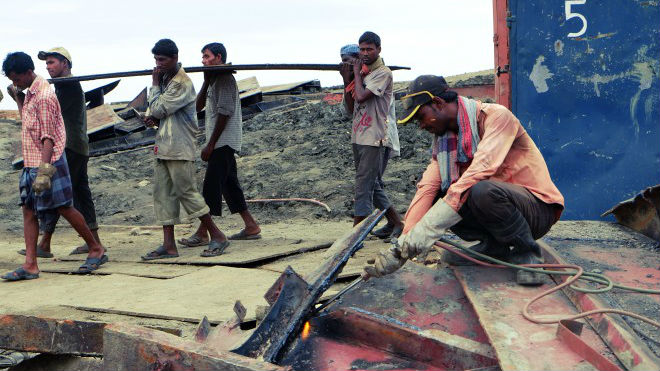
On Tuesday, the
Bangladesh High Court issued a contempt rule asking 14 government officials and
the president of the Bangladesh Ship Breakers Association (BSBA) to explain why
they have not implemented the Court’s judgement dating March 2009.
NGO Shipbreaking
Platform reports that the Court now demands arguments from the respondents as
to why they should not be held responsible for contempt of the court’s rulings
and “for deliberately and persistently ignoring safety of the workers and safety
and integrity of the environment.”
The government was
also meant to form an independent committee for the impartial supervision of
the shipbreaking activities. The court decision is the result of a contempt
petition submitted by the Bangladesh Environmental Lawyers Association (BELA),
the Platform member organisation that has been fighting in the courts against
the shipbreaking industry’s violation of the law since 2003.
The government
officials and the president of the BSBA do not have to appear in Court in
person yet, but will have to submit written answers. If the court deems their
answer not satisfactory they may then be summoned to court.
"This step
taken by the High Court fundamentally challenges the apathy of the government
agencies in regulating the shipbreaking sector as well as the strong culture of
impunity the owners of shipbreaking yards enjoy due to their political
connections,” says advocate Rizwana Hassan, Chief Executive of BELA and
initiator of the petition. “This must end. We cannot accept any more deaths of
laborers, and someone has to finally take responsibility for the fatal
accidents.”
BELA has also asked
the Court to suspend the activities of 42 shipbreaking yards. In the case of 37
yards, BELA has accused the companies of unsafe working conditions resulting in
accidents and deaths, and for seven yards BELA has provided information on how
these companies violate the requirements for their environmental clearances.
BELA is gathering more evidence so the number of yards to be closed is likely
to rise even further.
“Despite the
high-profile Court order given in March 2009, both the shipbreaking industry
and responsible ministries have remained inactive in addressing the pressing
issues related to both occupational health and safety and to environmental
pollution and hazardous waste dumping,” says Patrizia Heidegger, Executive
Director of the NGO Shipbreaking Platform. “We insist that they will not be
allowed to get off lightly yet another time.”
In March 2009, the
High Court had ruled that the government is to set up a committee to ensure the
impartial supervision of the shipbreaking industry. The Court also found that
the shipbreaking yards did not hold the necessary environmental clearance to
operate. As a consequence, the yards were temporarily shut down. The Court
demanded that the government comply with the requirements under the Basel
Convention on the Control of Transboundary Movements of Hazardous Wastes and
their Disposal. This included the respect for Prior Informed Consent (PIC),
that is, the approval by Bangladesh of the import of ships based on the amount
of toxics on board the end-of-life vessels.
The political clout
of the shipbreaking industry, amongst them members of Parliament and other
powerful politicians as well as some of the most influential industrialists in
the country, managed hastily issued environmental clearances for their yards,
says the platform. It also alleges that for the import of end-of-life vessels
to Bangladesh, the authorities blindly accept fake certificates stating that
all the old ships are free of hazardous waste.
The independent
Committee, which according to the Court should also include non-government
organizations and labor unions, has never been made functional. BELA argues
that at least 93 workers have died since the 2009 Court order. All this has
passed without consequences.
Both the
shipbreaking industry and the government of Bangladesh are now asked to give
account of their actions. If they fail to produce sufficient arguments, responsible
persons are likely to be sentenced and yards may be closed down.
Source: maritime-executive.
13 April 2016
No comments:
Post a Comment